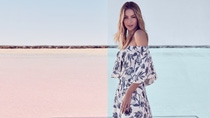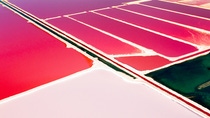Pretty in pink

Iconic Australian retailer, Myer, launched their Spring 2016 campaign this week with an advertising campaign starring the Face of Myer and former Miss Universe winner, Jennifer Hawkins.
The iridescent salt lakes at BASF’s Hutt Lagoon facility in Western Australia were a natural choice to complement the pink hues of the retailers’ Spring 2016 Australian and international designer collections for women.
The salt lakes take on a pink colour from the presence of algae which grows in the salt water from which BASF harvests natural beta-carotene.
While the lakes’ visual appeal is clear, we asked BASF health and nutrition expert, Dr Belinda Gray, more about beta-carotene and the benefits of consuming it.
“Beta-carotene is a naturally occurring red pigment found in fruits and vegetables, including carrots, pumpkins and sweet potatoes,” said Dr Gray.
“At BASF, we grow a naturally occurring algae in open-air seawater lagoons which, when exposed to sunlight, produces carotenoids, predominantly beta-carotene, to protect itself.”
The carotenoids are preserved using mechanical harvesting and minimal mechanical processing.
“The food and beverage industry is increasingly using natural beta-carotene as a healthy alternative to artificial food dyes,” said Dr Gray.
This follows research from Southampton University in the UK, which reported a possible link between hyperactivity in children and artificial food colours - or, the ‘red cordial effect’.
The complementary medicines industry seeks out BASF’s natural beta-carotene for its numerous other benefits.
Beta-carotene acts as an antioxidant that protects cells and tissues against oxidative stress, such as cardiovascular disease, skin ageing and cancer. It also helps to protect our eyes, absorbing the blue light emitted from television and computer screens that can damage eye tissue over time.
Beta-carotene is also the main precursor of Vitamin A, converted by the body as and when it is needed. Vitamin A is an essential nutrient, particularly important for normal growth and development, proper function of the immune system, healthy skin and vision.
Vitamin A itself is only present in animal-derived foods, such as liver, tuna and dairy products. A certain proportion of our Vitamin A requirements are converted from dietary beta-carotene intake. Those eating few or no animal derived foods, i.e. vegetarians or vegans, are more reliant on beta-carotene intake to achieve adequate levels of Vitamin A.
BASF is the world’s largest producer of algal beta-carotene, all of which is grown at its facilities at Hutt Lagoon in Western Australia, and Whyalla in South Australia.
